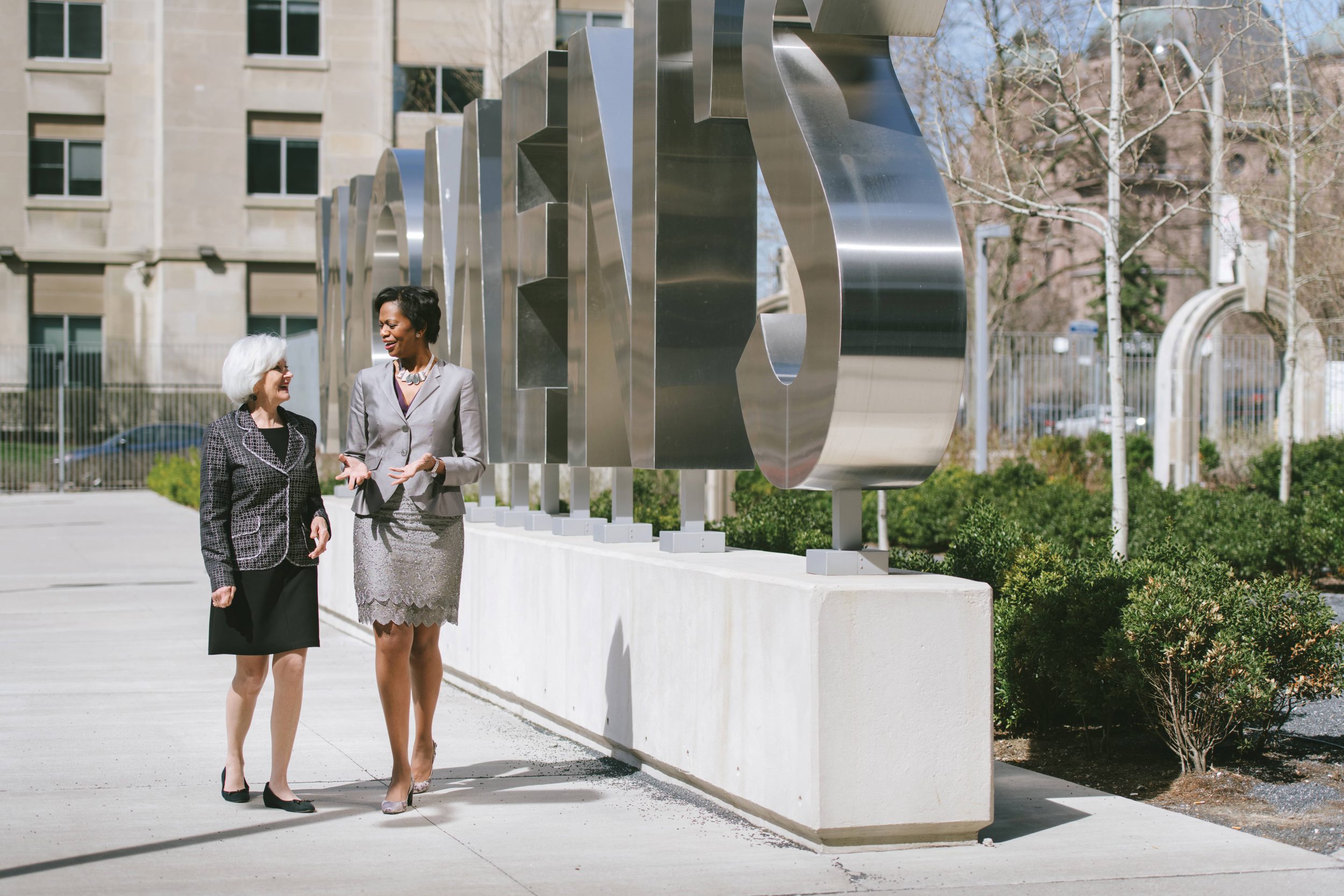

How women are changing the trajectory of healthcare
Since its inception in 1883 as the first place in Canada where women could study and practice medicine, Women’s College Hospital’s (WCH) bold vision—to create a healthier and more equitable world for everyone—has been driven forward by generations of women philanthropists and community leaders.
Today, that legacy of women-led philanthropy and volunteerism continues through an ever-growing wave of support that’s being spearheaded by two unique groups committed to championing the work and impact of Women’s College Hospital: 100Women, a community of leading women philanthropists, and neWCHapter, a committee of young professionals dedicated to rallying emerging changemakers around a shared cause.
When it comes to philanthropy, women offer a different perspective than men—just as they do in other arenas of life, says Jennifer Bernard, president and CEO of Women’s College Hospital Foundation. “Women are using their philanthropic power and volunteerism to bring about change in areas such as healthcare and social justice,” she says. “For Women’s College Hospital, a passionate community of women has been by our side since the day our doors opened, influencing and shaping healthcare for women across the country.”
Indeed, WCH was founded by pioneering women willing to stand up as advocates. Dr. Emily Stowe, for example, the first Canadian woman to practice medicine in Canada, rallied for women to have the right to study medicine and established Woman’s Medical College in 1883 (the precursor for WCH). “Great strides have been made in healthcare for women since Women’s College Hospital first opened its doors, but women do continue to face many serious gaps that put their lives and well-being at risk,” says Bernard. “Many of these gaps are the result of a lack of medical research that considers the unique needs of women.”
Indeed, research for women, and by women, continues to be vastly underrepresented; in fact, until the 1990s women were not required to be included in research studies. “Most drugs have been developed without being tested on women,” says Bernard. “Pharmaceutical drugs play an enormous role in healthcare, so it’s important that we understand how these medications may affect women differently.”
Supporting cutting-edge women’s health research is a major focus for Women’s College Hospital, which is home to one of the only hospital-based research centres in the world with a unique focus on identifying and addressing health gaps affecting women. Key areas of exploration include issues related to aging, women’s cancers, mental health and musculoskeletal health.
With women’s health issues coming into focus and women giving a greater proportion of their investible assets to charity compared to men, their collective impact on the future of healthcare has the potential to be profound.
For Jane Pepino, partner at law firm Aird & Berlis and a member of the 100Women initiative, it’s Women’s College Hospital’s unique approach to delivering care that’s creating change. “This is a hospital that’s doing things differently,” she says. “It champions a spirit of collaboration, consultation and putting the patient at the middle of everything, and that leads to equity at large and leads to innovation at large.”
Pepino says that the hospital’s founding focus on training women to become doctors at a time when they were not otherwise permitted to study medicine is a big part of why she supports the hospital. “It’s not simply improving women’s health but, as importantly, it’s driving women’s leadership in medicine and allied professions—nursing and pharmacy and hospital governance—and also in medical research about women’s health.”
WCH invests in women, but also in innovation, health equity and health system solutions. As part of its new mandate as an independent hospital, WCH became the first academic ambulatory hospital in Ontario, which required a new building. “One of the proudest days of my life was when they cut the ribbon of that building,” says Pepino.
The hospital itself was purpose-built for ambulatory care—meaning no one stays overnight. As the way of the future for healthcare—less time in hospital means less exposure to infection, better patient outcomes and reduced costs to the health system—ambulatory care requires outside-the-box thinking to enable many traditionally inpatient procedures to be conducted on an outpatient basis. In short, Women’s College Hospital is known as the hospital without beds.
For example, through the use of innovative approaches to anesthesia and new surgical techniques, the hospital’s surgery team is now able to conduct total joint replacement operations, have patients walking just a few hours after surgery and return home the same day equipped with a virtual application that provides direct access to their WCH physicians and care teams.
This commitment to innovation is one of the reasons Katie McGarry, a partner with KPMG, joined neWCHapter; she’s now co-chair. Initially a patient at the hospital, McGarry was impressed with the service she received—and impressed with WCH’s role in health equity and innovation. “I’m very passionate about the advancement of women, and helping to close the healthcare gap is something I want to be part of,” she says.
McGarry believes Ontario needs to make fundamental changes to its healthcare model. “Our hospital is making some bold changes—it’s incredible that we’re now able to do a number of same-day surgeries that were traditionally done in a hospital where patients would stay overnight, often for several days.”
By hosting engaging and informative events at trendy locales around Toronto, neWCHapter is creating a culture of giving back among the city’s emerging leaders. neWCHapter holds three to four events per year—from movie nights to spinning classes and yoga—to raise awareness about these bold changes. The committee’s annual signature fundraising event, Women Paying it Forward, is a sought-after education session and networking opportunity that offers the community a unique chance to learn more about important issues impacting healthcare.
Michelle Myers, also a partner at KPMG, was first exposed to neWCHapter during a movie night. She’s now co-chair. “Fundraising is part of it, but the bigger part is raising awareness and letting people know about the unique and amazing programs being developed at Women’s College Hospital,” she says.
That includes raising awareness of the healthcare gap for women—something Myers is passionate about. “I think it is important to talk about the physiological differences between women and men—to talk about why it’s important, and why we should be thinking about it.”
Through neWCHapter, Myers is committed to raising funds for women’s health initiatives such as the hospital’s virtual mental health program, where patients communicate with doctors from home via smart technology—allowing them to connect when it works for them.

The use of technology to transform healthcare is also an area of passion for Elisabetta Bigsby, a member of 100Women as well as Women’s College Hospital Foundation’s Advisory Council, a special committee of community leaders and donors who provide guidance and support for the Foundation’s activities. While she has long been impressed by the quality of care she receives at WCH, she is also an advocate for innovation and quality outcomes in healthcare.
“The care has always been so good, so prompt, so sensitive,” says Bigsby. “As time went by I quite spontaneously thought I needed to do something for this hospital.” She’s now a champion of the WCH Institute for Health System Solutions and Virtual Care (WIHV), created to transform the way patients experience their care through cutting-edge research and evaluation.
She’s taken her philanthropy further by sponsoring a senior fellowship position in quality and innovation improvement at Women’s College Hospital, which provides a system-wide platform for quality improvement through 2022 to improve the care experience and achieve even better clinical outcomes for patients.
Philanthropic efforts are helping to fuel this innovation, which in turn helps more women. “Women truly are leading the healthcare revolution,” says Bernard. “We are inspired by the growing wave of support we’re seeing from women of all ages and stages of their careers, who are joining together in a movement to help bring equity to healthcare—a movement that will directly benefit women today and tomorrow. This is what Women’s College Hospital is all about: women using their collective power to create change.”